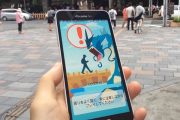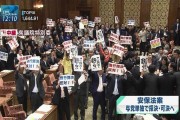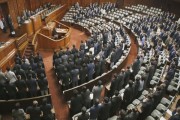Constitutional revision has been a controversial topic under the current Abe administration. While Abe and his cabinet are certainly in favor of revising the constitution, and in particular Article 9, which prevents Japan from having a military other than for purposes of self-defense, some citizens disagree.
A recent protest outside the Prime Minister’s residence against a new bill that would authorize collective self-defense made nation-wide news, but many Yahoo! netizens question the validity of a protest by what they call “professional citizens”. Others point out that Japan needs to move with the times, and that it is not only meaningless but even dangerous to hold to on postwar values.
From Yahoo! Japan:
“It Promotes War” “Protect The Constitution!”: 500 Person Protest Against Security Treaty Bill In Front Of Prime Minister’s Residence
On May 14, when a new bill related to the US-Japan Security Treaty [Anpo] was adopted by the cabinet that would authorize the right collective self-defense of the Japanese military, a protest rally was staged by citizens opposing the bill outside the Prime Minister’s residence in Nagatacho, Tokyo. Around 500 people (reported by organizers) gathered with placards and banners in hand, raising their voices in protest: “This bill does not promote peace, it promotes war!”; “The Prime Minister should protect our constitution!”.
Nishizaki Naoto (50), who works for an organization from Okayama City and was taking part in a protest rally for the first time, told us angrily: “It’s complete chicanery that they’re using the word ‘peace’ in this bill, which would allow them to authorize military force overseas”. Kitashima Akemi (66), a housewife from Machida City, Tokyo, glared toward the Prime Minister’s residence, saying: “The Security Treaty bill is something that will ultimately just make us complicit in America’s war. I’m completely against this violation of our constitution!”
Hanazawa Takeshi (77), an unemployed man from Toride City, Ibaraki Prefecture, who lost his home during air-raids when he was in the second year of elementary school, complained that “I’m fed up of war, I don’t even want to remember what happened back then. This government is trying to turn Japan into a country that can start another war like that”. Then, with a stern expression on his face, he said “How can we get the sense of danger through to young people? We have to tell them about what we experienced during the war”.
Harada Shigeru (67), an unemployed man who had hurried down from Kawasaki City, was born in May 1947, when the constitution was promulgated. He was incensed: “I’ve grown up with the peace constitution, but never in my dreams did I imagine I’d see it completely overturned. This is a coup d’état by our statesmen”. University student Anzai Takuma (19), from Hachioji City, was doubtful: “I don’t even have the right to vote yet, so all I can do is complain about it in places like this. Prime Minister Abe calls it proactive pacifism, but it doesn’t seem to me that being able to send our Self-Defense Force overseas will have all that much to do with peace”.
Comments from Yahoo! Japan:
不破雷蔵: [Opinion Author]
As you’d realize by checking your calendar, today is a weekday. Seems like we need to think carefully about the stance of the kind of people who can get involved in a movement like this for long periods at this time of day on a weekday. If you search for some of the people who appear in this article using their name and place of origin, like you would when a celebrity features in an article, you’d probably find that they had surprising(?) backgrounds.
Only the first paragraph of this article states objective facts; the second paragraph on publicizes the same as the claims of those participating in the protest, just in the form of an interview. This is the same as articles about the “online reaction” on some online news sites and on Chinese and Korean translation blogs, it has virtually no value as an object source.
There are no pictures in this article, but some media did publish pictures and videos of the protest rally. If you read the characters written on the banners that the participants are holding in one of those images, there is no doubt that your understanding of this situation would deepen.
yat*****:
If Article 9 of the Japanese Constitution really is all that splendid then you’d suppose it would have been adopted and put into practice throughout the world, so why then, even after 70 years, hasn’t anyone else got it? Did they ever think of that, these “professional citizens”? (´・_・`)
ste*****:
These days people who think that now isn’t the time to just protect the constitution are increasing.
inn*****:
According to organizers…
Come on, if there were almost 500 people there, how about having the journos do the counting?
ソラマメ:
Hmm, no matter how I think about it doesn’t look to me like there were 500 people participating in that…
I don’t suppose there were even as many as 100 there.
What’s more they were all elderly, they must all be baby-boomers.
Haven’t you lot realized yet that your way of thinking is going to ruin Japan?
vdtrrrr:
Wow, you can really tell that we live in an aging society.
Right now the reality is that countries in South East Asia are facing Chinese oppression and they require a Japanese military presence. In these evidently changing times, the international role Japan is required to play has also changed.
nor*****:
Who made our current constitution, and what for? Times have changed, and the Japanese people have to change too, for their own benefit.
kom*****:
We’ve kept this for 70 years like it was some golden rule. Do these people actually think that times haven’t changed?
tom*****:
People have to change as time goes on.
We should change our constitution. It hasn’t moved with the times.
sprush70:
It’s pretty hot out there so it must have been tough. But please do your best, even if it means collapsing there.
ニコラス・C・アイゼンハワー:
It’s only the anti-faction who report this stuff.
aki*****:
It doesn’t seem like there were 500 people at this protest.
I don’t suppose there were even 100 there, looking at it.
At least that’s what I think.
reg*****:
Times have changed. The US ain’t gonna protect us, and China and Korea are lying in wait for an opportunity. Now, as we’re trying to recover from economic recession, we can’t allow ourselves to just stay as a nation that lost a war on the international stage.
toka*****:
So there were 500 professional citizens there, huh?
If the organizers announce that there are 500 people there, then weren’t there probably far fewer than that?
通りすがりの笑い声:
At the time of the Anpo riots in the 1960s, the group of demonstrators numbered as many as 100,000 to 300,000 people.
The fact that at the present protests, there weren’t even 500 people there just goes to show that times have changed.
shi*****:
I suppose these protesters are all the same people who were in the student demos in the 1960s, right?
Back then they made a huge commotion, throwing Molotov cocktails and the like, and despite that, now they’re on about being anti-war. What the hell are they saying?
hi_*****:
And what was the real headcount?
300 people?
100 people?
Uh, 50 people.








